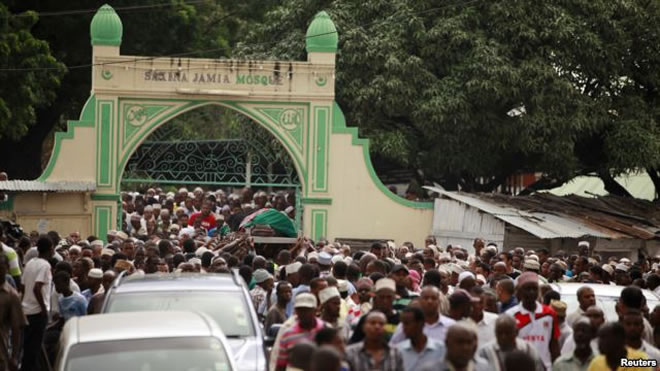
FILE - Muslims faithfuls carry a coffin with the body of Sheikh Mohammed Idris, chairman of the Council of Imams and Preachers of Kenya (CIPK), who was gunned down by assailants near his home in Mombasa, June 10, 2014.

Mohammed Yusuf
Thursday, July 17, 2014
The drive to the mosque, located in the Majengo neighborhood takes a little longer these days due to heightened concern about security. Motorists and pedestrians try to avoid the mosque in general.
Inside, there are few worshipers. It is quite a contrast to the days when the mosque was so full, many had to pray on the streets outside.
Musa long had a reputation of attracting young men due to what many describe as a more liberal and intellectually open atmosphere. It is that same reputation, which attracted authorities to scrutinize those preaching for radical content.
Now the young avoid the mosque, due to fears they will be caught in another security crackdown or labeled terrorist sympathizers.
Noor Abdullah, a 25-year-old Majengo resident is one of them. He said he stopped praying in the mosque after a police raid which left some people dead. He said he is too afraid it could happen again and he'd be caught up in it.
During that February raid, Kenyan security forces killed three people and arrested more than 100 young people - most of whom were later released by the courts.
But Kenyan security forces said they recovered an AK-47 rifle, knives, video disks and flags which bore the symbols of Somali militant group al-Shabab.
Kenyan authorities allege some of the Musa Mosque clerics are recruiting for al-Shabab among the poor young men in the rundown neighborhood of Majengo.
Sheikh Juma Ngao, the chairman of Kenya's Muslim National Advisory Council, argues worshipers should not be harassed because of a few individuals who are suspected of preaching hate and violence.
"People who are performing prayers in Musa mosque should not be any given time be harassed, even if there is one suspect or two in that mosque. It's not a reason to the government or police to harass the Muslims in that mosque. What they must do first they must do their investigation before taking any action like the way they did in the previous time," stated Ngao.
Local human rights organizations have accused Kenyan police of using heavy-handed tactics against the Muslim community, including forced disappearances and murder. Police have strongly denied the accusations and say their actions are in defense of a nation under attack from militants both inside the country and in neighboring Somalia.
Abdullah said families feel they are no longer safe and some are leaving Majengo altogether.
He said it is very sad to see how empty the mosque is during the holy month of Ramadan - which is a time when people especially loved to go. He said even people who live around the mosque have moved, leaving empty houses behind.
Sheikh Ngao said in the past four months, clerics and local human rights groups have been trying to work with the mosque leadership and young worshipers there to ensure that radicalism is not part of the culture, and to allay fears within broader Kenya. "They were ready to quit their understanding of Jihad and join the other side of the Muslim clerics and forge forward and march forward with their mission of peace," he said.
Ngao said the message of peace needs time to sink in, and the support of holy teachers so young people can truly understand their religion - in Musa and elsewhere.
Source: VOA